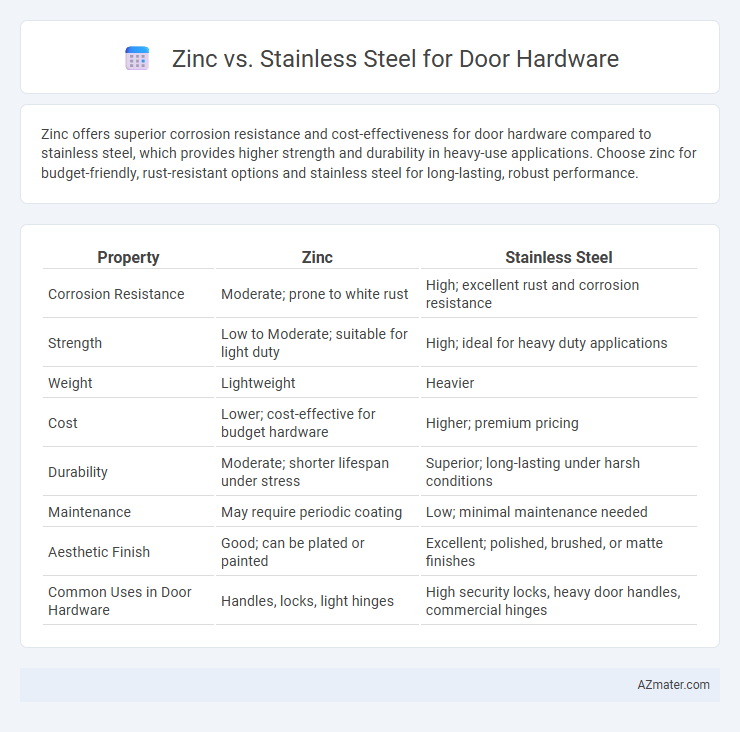Zinc offers superior corrosion resistance and cost-effectiveness for door hardware compared to stainless steel, which provides higher strength and durability in heavy-use applications. Choose zinc for budget-friendly, rust-resistant options and stainless steel for long-lasting, robust performance.
Table of Comparison
| Property | Zinc | Stainless Steel |
|---|---|---|
| Corrosion Resistance | Moderate; prone to white rust | High; excellent rust and corrosion resistance |
| Strength | Low to Moderate; suitable for light duty | High; ideal for heavy duty applications |
| Weight | Lightweight | Heavier |
| Cost | Lower; cost-effective for budget hardware | Higher; premium pricing |
| Durability | Moderate; shorter lifespan under stress | Superior; long-lasting under harsh conditions |
| Maintenance | May require periodic coating | Low; minimal maintenance needed |
| Aesthetic Finish | Good; can be plated or painted | Excellent; polished, brushed, or matte finishes |
| Common Uses in Door Hardware | Handles, locks, light hinges | High security locks, heavy door handles, commercial hinges |
Introduction to Zinc and Stainless Steel Door Hardware
Zinc door hardware offers excellent corrosion resistance and affordability, making it a popular choice for residential applications, while stainless steel provides superior durability and strength, ideal for commercial and high-traffic environments. Zinc alloys allow for intricate designs due to their malleability, whereas stainless steel ensures long-lasting performance with minimal maintenance. Selecting between zinc and stainless steel depends on the required balance between aesthetic versatility and robust structural integrity.
Material Composition and Properties
Zinc door hardware is typically made from zinc alloy, combining zinc with elements like aluminum and copper to enhance corrosion resistance and strength, making it cost-effective and suitable for indoor use. Stainless steel contains iron, chromium (usually 10-20%), and nickel, offering superior durability, rust resistance, and a sleek finish ideal for both indoor and outdoor door hardware applications. The high chromium content in stainless steel forms a passive layer that protects against oxidation, while zinc alloys provide moderate durability but may corrode faster in harsh environments.
Durability and Strength Comparison
Zinc door hardware offers good corrosion resistance and moderate strength, making it suitable for residential applications with minimal exposure to harsh environments. Stainless steel is highly durable, exhibiting superior strength and exceptional resistance to rust, ideal for commercial or high-traffic areas requiring long-lasting performance. The choice between zinc and stainless steel depends on the desired balance between cost-effectiveness and maximum durability in door hardware applications.
Corrosion Resistance: Zinc vs Stainless Steel
Stainless steel offers superior corrosion resistance compared to zinc, making it ideal for door hardware exposed to harsh weather or marine environments. Zinc provides moderate corrosion resistance through its natural oxide layer but may degrade faster in high-moisture or salty conditions. Choosing stainless steel ensures longer-lasting durability and minimal maintenance for corrosion-prone applications.
Aesthetic Appeal and Finish Options
Zinc door hardware offers a versatile range of finish options including brushed, polished, and matte, providing a modern aesthetic appeal with excellent corrosion resistance. Stainless steel hardware features a sleek and contemporary look with natural luster, high durability, and finishes like satin, mirrored, and brushed that resist tarnishing and wear. Both materials enhance door hardware aesthetics, but zinc allows for more varied textures and color customization, while stainless steel delivers a premium, long-lasting metallic shine.
Maintenance Requirements
Zinc door hardware requires minimal maintenance due to its corrosion-resistant properties, making it ideal for environments prone to moisture. Stainless steel, known for its superior durability and resistance to rust and stains, demands only occasional cleaning with mild soap and water to maintain its appearance. Both materials offer low-maintenance solutions, but stainless steel provides enhanced long-term performance in harsh or outdoor conditions.
Cost and Affordability
Zinc door hardware typically offers a more cost-effective solution compared to stainless steel, making it ideal for budget-conscious projects. Zinc alloys provide good durability and corrosion resistance at a lower price point, while stainless steel hardware delivers superior strength and long-term resilience, justifying its higher cost in high-traffic or outdoor environments. Choosing between zinc and stainless steel hinges on balancing upfront affordability with the expected lifespan and maintenance needs of the door hardware.
Environmental Impact and Sustainability
Zinc door hardware offers high recyclability and energy-efficient production processes, significantly reducing environmental footprint compared to stainless steel, which requires intensive mining and smelting, leading to higher carbon emissions. While stainless steel is durable and corrosion-resistant, zinc's lower energy consumption during manufacturing and better recyclability enhance its sustainability profile. Choosing zinc supports reduced resource depletion and promotes circular economy principles, making it a more environmentally responsible option for door hardware.
Common Applications in Door Hardware
Zinc door hardware excels in cost-effective applications such as lever handles, lock sets, and decorative knobs due to its excellent corrosion resistance and ease of casting into intricate designs. Stainless steel is preferred for high-traffic commercial doors, exterior entryways, and institutional settings where durability, strength, and resistance to wear and vandalism are critical. Both materials serve important roles, with zinc favored for aesthetic and budget-conscious projects while stainless steel supports heavy-duty, long-lasting hardware solutions.
Choosing the Right Material for Your Needs
Zinc door hardware offers corrosion resistance and cost-effectiveness, making it ideal for interior applications or decorative elements. Stainless steel provides superior strength, durability, and excellent resistance to rust, suited for high-traffic or exterior doors requiring long-lasting performance. Selecting the right material depends on environmental exposure, budget constraints, and desired aesthetic, ensuring optimal functionality and longevity for your door hardware.

Infographic: Zinc vs Stainless Steel for Door Hardware
 azmater.com
azmater.com